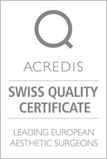Choice of doctor
How do I find the right doctor?

The field of cosmetic surgery is not lacking in offers from doctors or institutions. There are also doctors with questionable qualifications, limited training and lack of experience who offer services in cosmetic surgery. Intense advertising, fast appointments or low prices should not be the deciding factors. Critical thoughts are in order if a doctor offers an entire suite of cosmetic surgery - from hair removal to wrinkle smoothing, eyelid correction to liposuction and silicon implants: better a clearly defined range that is offered with technical perfection.

Education and examination prior to a procedure are important—it’s best to seek the opinions of two to three different service providers and then decide on the doctor that best suits you. The following checklist of the questions you should ask your doctor should serve to help in making your decision.
Questions you should ask your doctor

- Where and how long was the surgeon trained in liposuction? Did he receive the training from another doctor, and if yes, over what time period? What FMH title does the doctor have?
Only highly trained and experienced specialists can perform a surgical liposuction procedure. Too often doctors (and even sometimes non-surgeons) are trained in a seminar or learn the method from a video course.
- On how many patients has the doctor performed liposuction operations? How long has the method been practiced? How many patients does he treat in a year?
- What about quality assurance? Is there a designation (e.g. Acredis), where continual quality assurance is documented??
- Which liposuction method is offered (ultrasound, vibration, water jet)? Is a local anesthetic an option or is general anesthesia required?
- Is the preliminary information session held with the surgeon himself or with a consultant?
- Is the preliminary information session free of charge and non-binding?
- Has there been a “follow-up” on the subject, after the info brochure was mailed? Do not allow yourself to be pressured by follow-up calls or letters. You should decide for yourself whether, when and where you would like to be treated.
- Are you guaranteed a dream figure? Be wary of unrealistic promises for results. You should also find out what is not possible.

- Is there a sufficiently large (several hundred cases) photo documentation of "before and after" of patients the doctor himself has operated on? Ask to see photos of previous patients.
- Do you get access to a reference list of treated patients who are willing to discuss their experience and results?
- How high are the costs? Request information about the total cost, including drugs, compression dressings, operating room use, post op follow-up, etc.
- How is the course of the operation explained?
- What is explained to you about the length of time you will be unable to work following the procedure? It is quite unrealistic to expect to return to work on the next day; depending on age, extent of the operation and engagement required in the workplace, 2-3 days should be expected.
- Is the preliminary information session recorded in writing? It is important that areas to be treated, risks, complications and costs are documented in writing prior to any procedure and signed by both the patient and the surgeon.
How is follow-up support assured? When and who undertakes the follow-up care?

